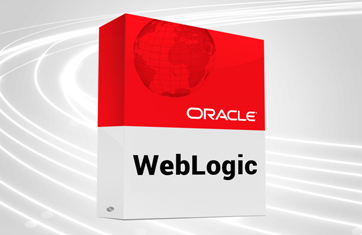Oracle WebLogic
What is Oracle WebLogic?
Oracle WebLogic is a Java application server that is widely used to deploy, run and manage enterprise Java applications. It is widely used in distributed computing environments where applications need to be scalable, reliable and high performing. Organizations across different verticals including banking, telecommunications, retail, healthcare and more use Oracle WebLogic for deploying Java-based web applications.

The key features of Oracle WebLogic
Oracle offers a wide range of features and capabilities that facilitate the development, deployment, and management of Java-based applications. Some key features include:
- Java EE Support: WebLogic server supports the latest Java EE specifications and has full support for Java Servlets, JavaServer Pages (JSP), Enterprise JavaBeans (EJB), Java Messaging Service (JMS), and many more.
- High Availability and Clustering: WebLogic supports clustering and high availability. Oracle WebLogic instances running on multiple servers can be clustered to ensure scalability and high availability. Automatic failover and load balancing features ensure uninterrupted service.
- High Performance: One of the main reasons why enterprises adopt Oracle WebLogic is for its high performance. It can handle large workloads and scale horizontally by adding additional service instances to the cluster. Features like caching, connection pooling and load balancing help enhance the performance of web applications.
- Management and Monitoring: WebLogic Server has a management console and command-line tools for monitoring and management. The built in WebLogic console can be used for different administration tasks and for overseeing the health of the WebLogic server.
- Security Features: WebLogic server includes robust security features. It supports various security standards and protocols, including SSL/TLS, digital certificates, and role-based access control (RBAC). It also integrates with Oracle’s Identity and Access Management solutions for centralized security management.
Oracle WebLogic as an embedded part of several Oracle products
Oracle WebLogic is often embedded and used as an application server in several Oracle products.
- Oracle PeopleSoft uses WebLogic as the application server.
- Oracle Financials is an application that runs on Oracle WebLogic.
- WebLogic Server is a key component of Oracle Fusion Middleware and is used as the application server for many of its products, including Oracle SOA Suite, Oracle WebCenter Suite, Oracle Identity Management, and more.
- WebLogic Server is the recommended application server for deploying and running Oracle Siebel CRM applications, ensuring high performance and availability.
- WebLogic Server is used as the application server for running Oracle E-Business Suite applications, providing a scalable and reliable platform for enterprise resource planning (ERP), customer relationship management (CRM), and other business processes.
What are some of the key metrics to track to monitor Oracle WebLogic?
Since Oracle WebLogic runs on a Java virtual machine, it is essential to monitor the JVM and its internals in-depth. Performance of the JVM garbage collector, usage of the JVM’s heap memory, threads running in the JVM are some of the key metrics to collect. WebLogic exposes key metrics about the application server via Java Management Extensions interfaces so monitoring tools can track the application server’s performance. Key metrics include the traffic on each connector, response time for servlets, errors seen by the container and so on. WebLogic logs are also a great source of metrics. Access logging must be turned on for this. To get greater insights into applications hosted on WebLogic, distributed transaction tracing can be implemented using tools like eG Enterprise.
Learn more about comprehensive WebLogic monitoring capabilities included in eG Enterprise here: https://www.eginnovations.com/supported-technologies/weblogic-monitoring


